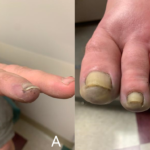Large language models are a type of AI that allows users to generate new content, drawing from a huge dataset to learn how to mimic “natural language” with many possible beneficial applications for this technology in medicine.


Jacqueline Jansz, MD, & Peter T. Sadelski, JD |
Large language models are a type of AI that allows users to generate new content, drawing from a huge dataset to learn how to mimic “natural language” with many possible beneficial applications for this technology in medicine.

“When you get a good mentor, don’t let ’em be the one that got away.” Richard Brasington Jr., MD, FACP, MACR, told me this about a decade ago when I was a rheumatology fellowship applicant and first met him. It was clear the statement was influenced by his love of fishing. Dr. Brasington’s office was…

Elizabeth Hofheinz, MPH, MEd |
A pilot membership model is empowering members to come home to the ACR/ARP, with a streamlined website, as well as simplified, robust membership options.

Emily Molina, MD |
My patients ask me almost daily what kind of diet they should be on, or if there are certain supplements they should try. And a growing amount of evidence shows lifestyle and dietary factors may contribute to disease risk and outcomes in rheumatic disease. Thus, rheumatologists and rheumatology professionals are being called upon by patients…

Nedal Darwish, MD, Mohamed Manaa, MD, Griffin Reyes, MD, & James G. Freeman, MD |
Defined by the presence of antiphospholipid antibodies (aPL) in individuals with clinical evidence of thrombosis or pregnancy morbidity, antiphospholipid syndrome (APS) is a systemic autoimmune thrombophilia. Clinical thrombosis, which should be confirmed by objective validated criteria (e.g., imaging studies or histopathology), can occur in the arterial, venous or small vessel vasculature and is not limited…

In April, the Medicare Payment Advisory Committee voted to recommend a change in the add-on payment for Part B drugs, including reducing payment for more expensive drugs. The ACR sent a letter to MedPAC expressing concerns about the significant impacts such policies would have on rheumatologists.

Belinda Birnbaum, MD |
It’s easy for rheumatologists and rheumatology professionals to feel frustrated by burdensome administrative tasks, complicated insurance policies and other healthcare hurdles. Advocacy offers a way to channel those complaints into constructive action, says Belinda Birnbaum, MD.

Roughly six years ago, Nigil Haroon, MD, PhD, MBA, division head of rheumatology at the University Health Network, Toronto, traveled almost 9,000 miles from his home to Papua, New Guinea. His plan was to photograph the Raggiana bird-of-paradise, which can only be found in the tropical forests of eastern New Guinea. He spent about two…

Arthritis Foundation Establishes Dr. Herbert S.B. Baraf Award for Excellence in Arthritis Care In October 2022 at its annual Commitment to a Cure Gala, the metropolitan Washington, D.C., chapter of the Arthritis Foundation presented its medical honoree, Herbert S.B. Baraf, MD, FACP, MACR, with the inaugural eponymous Dr. Herbert S.B. Baraf Award for Excellence in…

Emily A. Johnson, JD |
Do you remember where you were when the COVID-19 Public Health Emergency (PHE) was declared on Jan. 31, 2020? While it may seem like yesterday, you would be forgiven for not recalling your exact location over three years ago during what felt like an incredible whirlwind for the healthcare industry. One possible location you may…

Research from Choi et al. provides insights into the risk of infection in patients with rheumatoid arthritis (RA), comparing patients treated with Janus kinase inhibitors vs. tumor necrosis inhibitors. The most frequent infection was herpes zoster, with patients treated with JAK inhibitors having a significantly greater risk of herpes zoster infection than those treated with TNF inhibitors.

Stimulating human programmed cell death protein 1 (PD-1), a checkpoint inhibitory receptor, with peresolimab may be a viable way to treat autoimmune diseases, according to a study by Tuttle et al. In the study, patients with active rheumatoid arthritis (RA) who were treated with peresolimab experienced greater improvements in disease activity than those who received placebo.